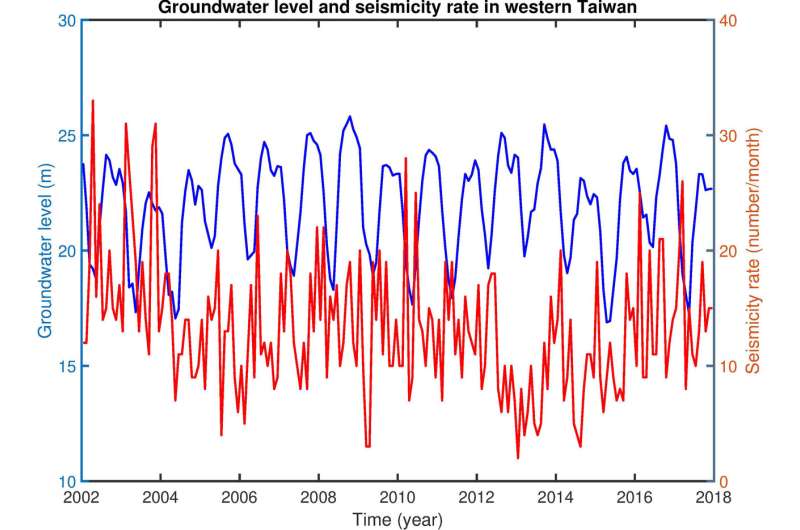April 15, 2021 report
Researchers find link between earthquake timing and water cycle in Taiwan

A team of researchers from Taiwan, Canada and the U.S. has found a link between the water cycle in Taiwan and the timing of earthquakes there. In their paper published in the journal Science Advances, the group describes their study of the water cycle in Taiwan and why it appears to be related to the timing of earthquakes.
The work began when one of the team members noticed that large earthquakes in Taiwan seemed to happen more often in the dry season. Taiwan is subjected to heavy rains and frequent typhoons each year between May and September. In other months, the amount of rainfall is much less. Prior research has shown that because of the dramatic shifts in rainfall amounts, groundwater levels change dramatically, as well. In this new effort, the researchers wondered if reduced groundwater levels, which leave empty cavities below ground, could be behind some of the many earthquakes experienced by the country. To find out, they collected both earthquake and rainfall data for the country, in some cases going back several hundred years. They also added satellite data that allowed for measuring water storage on the island.
The researchers found seismic activity was indeed highest during the dry season, particularly during the driest periods of February, March and April—just before the start of monsoon season. They also found that seismic activity was most quiet from July to September—typically the wettest part of the year. The researchers also found that the decreased water load belowground during the dry season often resulted in the land above rising, which increased the odds of earthquakes occurring. They also found that there were different factors involved in earthquakes that occurred on the east side of the island versus the west. Earthquakes that occurred on the east side of the island had a more complex pattern, and were less related to weather.
The researchers note that the annual stresses to the land beneath the island could be contributing to deeper stresses that occasionally result in ruptures of large faults, leading to some of the larger earthquakes that occasionally rock the island. Their findings could have implications for other parts of the world that experience dramatic fluctuations in rainfall each year.
More information: Ya-Ju Hsu et al. Synchronized and asynchronous modulation of seismicity by hydrological loading: A case study in Taiwan, Science Advances (2021). DOI: 10.1126/sciadv.abf7282
Journal information: Science Advances
© 2021 Science X Network



















